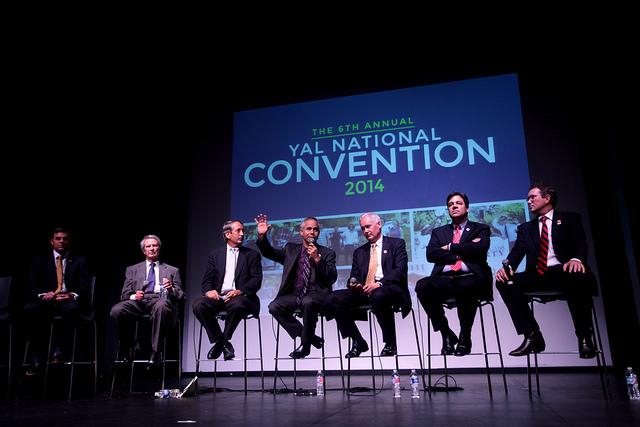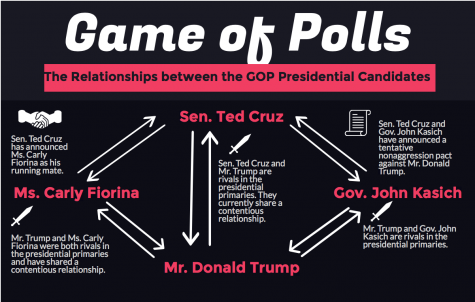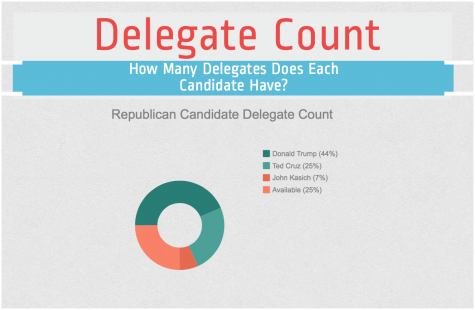Politics Playbook: Explaining the House Freedom Caucus
Aiming to overhaul established political procedures, representing the most hardline stances of the conservative political movement and throwing a spanner in the traditional discourse and conduct of Congress, the House Freedom Caucus has roared to headlines with its pivotal role in the disarray around the position of speaker of the House.
Taking the political world by storm, former Speaker of the House John Boehner announced his resignation on Sept. 25, 2015 during an increasingly perilous period of time when partisan gridlock threatened to shut down the government if consensus over a bill that provided funding for Planned Parenthood could not be reached. Political officials stipulate that Mr. Boehner’s abrupt departure stemmed from his desire to unite a fractious Republican Party before a shutdown could occur; however, many suspect that the Freedom Caucus and other hardline conservatives served a large role in prompting his resignation.
Presenting official reasoning for opposing Mr. Boehner on behalf of the Freedom Caucus, Rep. Justin Amash, one of the leaders and founders of the caucus, stated, “The problem isn’t that he isn’t conservative enough. The problem is that he doesn’t follow the process.”
Mr. Amash elaborated further, saying, “He operated a top-down system, and still operates a top-down system because he hasn’t stepped down yet. This means that he figures out what outcome he wants, and then he goes to individual members and attempts to compel and coerce us to vote for that outcome.”
Many establishment Republicans heaped scorn upon the Freedom Caucus, believing that Mr. Boehner’s resignation was caused in large part by the Freedom Caucus’ unwillingness to compromise, and also by the far right flank of the party in general. Representing some of the disdain establishment Republicans feel towards the Freedom Caucus, Rep. Charlie Dent referred to the Freedom Caucus as “rejectionists,” advising the Republican Party to marginalize the caucus’ members to lessen their power and to refrain from “appeasing” their unreasonable demands.
This view is mirrored by many members of the GOP, many of whose existing dislike of the Freedom Caucus was stirred into a frenzy over Mr. Boehner’s resignation. According to Ms. Linda Qiu, Washington expert, “Roughly 200 Republicans believe that retaliation [against the Freedom Caucus] is completely appropriate, and many have reportedly been privately imploring Mr. Boehner’s team to take more aggressive actions against them, like stripping the rebels of gavels, denying them travel, halting campaign cash and blocking their bills from the floor.”
Explaining what the current relationship between the GOP and the Freedom Caucus is like, Ms. Susan Lueders, government teacher, said, “I think that [this relationship] is tense. [The Freedom Caucus] is not allowing the Republican Party to speak with one voice since they’re a detracting voice and stick to their guns, making it difficult for mainstream Republicans.”
The feud between the Freedom Caucus and establishment Republicans extended to their endorsements for the speaker of the House position. In fact, the ensuing turmoil between the two groups became so great that, in a stunning deviation from political precedent, the speaker of the House position, one of the most powerful and prestigious positions wherein its possessor governs the majority party and is the second in the United States presidential line of succession, became viewed as political suicide. Showcasing the current toxic environment associated with the role, when asked if he would consider running for the job, Rep. Mac Thornberry stated, “I’d rather be a vegetarian.”
The rifts in the GOP were further exposed when Rep. Kevin McCarthy, considered to be the GOP’s preferred successor to Mr. Boehner, abruptly dropped out of the race on Oct. 8, 2015, a move that shocked his colleagues.
It is largely theorized that his decision was prompted by fears of having to govern the hardline Freedom Caucus. Although he never confirmed this theory outright, in his departing speech, Mr. McCarthy seemed to insinuate that it was indeed the reason, stating, “I don’t want to go to the floor and win with 220 votes. I think the best thing for our party right now is that you have 247 votes on the floor.” The 220 rather than 247 votes comment seemed to specifically refer to the Freedom Caucus and the large portion of its members that would likely abstain from voting on behalf of him or any of his proposed legislation.
Indeed, the Freedom Caucus decided to rebel from backing the GOP favorite Mr. McCarthy in favor of supporting Rep. Daniel Webster, a relative unknown, because they believed that Mr. McCarthy would do little to reform the operational structure of the House floor. Because Mr. McCarthy could not afford to lose more than 29 votes if he wanted to win with Republican support, the 30 or more members of the Freedom Caucus pledging votes to Mr. Webster essentially jeopardized his chances of maintaining his speakership position on the House floor.
After Mr. McCarthy’s unexpected dropping out, Wisconsin Rep. Paul Ryan became the GOP’s preferred candidate despite his initially vehement declinations. Eventually, after demanding a near-unanimous consensus among the warring factions in the Republican Party if they wanted him to accept the position, Mr. Ryan managed to gain a large supermajority of votes needed for him to become the speaker of the House. Although the Freedom Caucus didn’t acquire the 80 percent support needed for an official endorsement, a large majority of the caucus promised to back Mr. Ryan’s bid for speaker.
Mr. Ryan was sworn in as speaker of the House on Oct. 29, 2015, commanding 236 of 245 Republican votes. In his opening speech, he emphasized his goals of empowering committee chairmen and decentralizing power in an institution that has long been managed from the top-down rather than the bottom-up. This promise is largely viewed as what allowed him to win over the contentious Freedom Caucus.
However, despite all the controversy surrounding the organization, the truth about the Freedom Caucus remains unknown to many. So one question remains: what exactly is the Freedom Caucus?
Formed during the Homeland Security Budget Crisis of 2015, the House Freedom Caucus’ mission statement is that it “gives a voice to countless Americans who feel that Washington does not represent them. We support open, accountable and limited government, the Constitution and the rule of law and policies that promote the liberty, safety and prosperity of all Americans.”
In response to what they viewed as the overall political establishment deriding conservative policies, the Freedom Caucus was founded by nine House Republican representatives: Mr. Scott Garrett, Mr. Jim Jordan, Mr. John Fleming, Mr. Matt Salmon, Mr. Justin Amash, Mr. Raùl Labrador, Mr. Mick Mulvaney, Mr. Ron DeSantis and Mr. Mark Meadows.
The organization doesn’t have an official roster or a website; instead, it is more or less a group that operates together “unofficially.” After Rep. Tom McClintock resigned from his caucus position, writing in a letter to the caucus chairman that the group’s methods have “repeatedly undermined the House’s ability to advance conservative principles,” it is largely estimated that the group now possesses 37 of the 435 members in the House.
Based on unofficial talks, it seems like some of the caucus guidelines permit members to speak openly about their own membership, but otherwise forbid them from revealing the identities and statuses of other members. “It’s like ‘Fight Club,’” Rep. Jim Bridenstine, caucus member, said. “The first rule is that you don’t talk about it, and the second rule is that you don’t talk about it.”
Aware of its reputation for secrecy, Mr. Fleming stated, “We’re not deliberately being transparent.” However, despite his statement, reporters Mr. Carl Bialik and Aaron Bycoffe from Five Thirty Eight revealed that one member of the caucus, discussing the classified rules on a condition of anonymity, said that “the caucus believes keeping GOP leaders in the dark could be an advantage as it stakes out its next moves.”
As a result of its lack of transparency, very little is known about the caucus. Here is what is known for sure: there are nine founders and three full-time aides; members can reveal their own membership but not the details of others’; it takes a majority of 80 percent to take an official position.
While little is known about the group’s membership, it can generally be estimated that the members tend to lean more heavily conservative than the rest of the GOP, and that they possess a penchant for anti-establishment stances. According to the DW-Nominate, a vote polarization measurement system, their districts have an average Partisan Voting Index of R+14, which means that it votes 14 percentage points more Republican than the nation as a whole, 3 percentage points higher than the average of R+11 by other Republicans who won their House districts in 2012.
Two of the founders are largely viewed as the most conservative members within the House, with CNN referring to Mr. Meadows as the “architect of the government shutdown” due to his staunch stances and with The New York Times profiling Mr. Amash as the most contrarian Republican due to his stance on Planned Parenthood.
In addition to being more conservative, group members tend to have less experience in office and are more likely to be male. The average caucus member is within his or her third term, whereas most other Republican members are in their fifth, and there is only one female member, Rep. Cynthia Lummis, in the caucus, in contrast to the 10 percent of other Republican representatives who are women. Revealing why they can politically afford such hardline stances, they were elected in districts that lean more heavily Republican than the typical Republican representative’s district, which allows them much more leeway in supporting conservative ideals.
Over the course of its tenure, the group has held three official positions: opposing the reauthorization of the Export-Import Bank, disapproving the resolutions of both the Washington, D.C. abortion law and the House’s version of the bill (HJ Res 43) and endorsing a bill (HR 2802) that protects the tax-exempt status of churches that refuse to perform same-sex weddings.
Once a group focused on decreasing spending, the group’s current main goal seems to be an overhaul of the system of management in the House.
Based on a questionnaire handed out to speaker candidates, it can be assumed that they wish to “decentralize” the Steering Committee, a panel that decides committee assignments, such as the priorities of order of business and the management of the general course of operations, by ridding it of the speaker and majority leader’s immense influence; to ensure that debt limit increases would only be done if they involved reforms to entitlements, such as Medicaid; to impeach IRS Commissioner John Koskinen; to pass all 12 spending bills and refuse to capitulate to a continuing resolution “if Senate Democrats try to block the appropriations process”; to ensure greater representation of regular House members by granting each member the ability to bring legislation to the floor if he or she has the support of at least 15 other members; and to oppose proposals for amendments to punish members for procedural or ethical votes.
To summarize, besides topical stances, the Freedom Caucus’ main goals mainly involve changing the power structure of the House so that it becomes more of a bottom-up rather than a top-down institution, doing so by granting each member greater influence and weakening the power of the speaker and majority leader.
Overall, the level of influence that the Freedom Caucus wields remains unknown. They have faced losses: according to Mr. Matt Fuller, Washington expert, the caucus “was at the forefront of the failed effort to block President Barack Obama’s executive action on immigration earlier this year,” and “many Republicans think it’s only a matter of time before the Export-Import Bank is renewed.”
In addition, their overall appeal among Republicans remains unknown. Dislike towards the caucus on behalf of establishment Republicans is obvious, but the sentiments of other Republicans are a lot more vague. It’s generally assumed that most Republicans’ sentiments towards the caucus lean towards disapproval, stemming from their desire to expunge the GOP’s reputation for dysfunction and ingroup bickering.
However, while no one is exactly sure how much power the Freedom Caucus wields, they certainly do possess hefty influence on the lawmaking process. Their level of influence is mainly a result of numbers, since the caucus possesses enough members that the GOP leadership must negotiate with them in order to pass legislation with solely the Republican vote, a method that has been extremely prevalent in current years due to partisan rifts in Congress.
Exemplifying their power, the Freedom Caucus nearly derailed the Trade Promotion Authority Bill, trade legislation supported by both President Barack Obama and Mr. Boehner, when a large percentage of the caucus rebelled against a key procedural rule and called for amendments to the existing legislation. To showcase the amount of influence they wield even on a management level, after Rep. Meadows was stripped of a subcommittee gavel to punish him for taking part in the trade rebellion, the Freedom Caucus pressed both leaders and the Oversight and Government Reform Chairman Jason Chaffetz into reversing the decision and reinstating his power.
This year, the power of the Freedom Caucus might increase. With anti-establishment fervor growing at an exponential rate in American politics, as evidenced by the surging popularity of Sen. Bernie Sanders among the Democrats and the dominance of candidates such as Dr. Ben Carson, Mr. Donald Trump and Sen. Marco Rubio among the Republicans, as well as by the waning power of establishment favorites like former Gov. Jeb Bush, anti-establishment policies, including the hardline stances set forth by the Freedom Caucus, might become increasingly supported by constituents, influencing the overall political environment of Washington as a whole to become more favorable to Freedom Caucus interests.
Attesting to the potential increase in bipartisanship in the House as a result of the Freedom Caucus’ increasing power, Mr. Joseph Ciurlik, social studies teacher, stated, “I think that [the Freedom Caucus] has considerable influence because, although it’s unknown how big the bloc is, they’re a big enough influence to force Republicans to cooperate with Democrats to pass legislation.”
“In an odd sense, [the Freedom Caucus] is strengthening bipartisanship and increasing the influence of the minority party in the House,” Mr. Ciurlik said.

Madina Jenks is a senior and a new copy editor for Highlander Publications. As a copy editor, her jobs are pretty simple: write and help others write....






